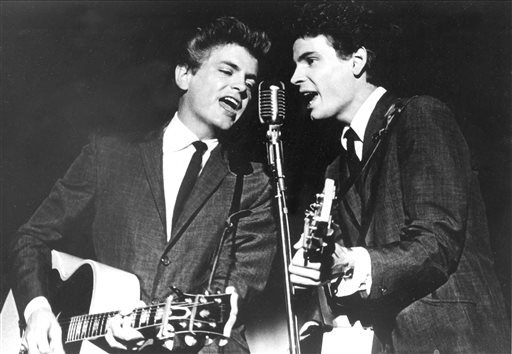Phil Everly of famed rock duo dies at 74
REUTERS
LOS ANGELES — Phil Everly, whose high, close-harmony singing with his older brother Don made the Everly Brothers one of the biggest rock and country acts of the 1950s and early 1960s, died on Friday at the age of 74, the Los Angeles Times reported.
Everly died in the Los Angeles suburb of Burbank of complications from chronic obstructive pulmonary disease, his wife, Patti, told the Times.
“We are absolutely heartbroken,” Patti Everly told the paper. “He fought long and hard.”
The Everly Brothers profoundly influenced 1960s-era artists ranging from Beatles John Lennon and Paul McCartney, who early in their careers called themselves the Foreverly Brothers, to Simon and Garfunkel, the Byrds, the Hollies and the Beach Boys.
“Perhaps even more powerfully than Elvis Presley, the Everly Brothers melded country with the emerging sound of Fifties rock &roll,” Rolling Stone magazine said in placing the duo at No. 33 on its list of the “100 Greatest Artists.”
Phil and Don had an onstage breakup in 1973 that led to a decade-long estrangement, but Phil later told Time magazine their relationship had endured. “Don and I are infamous for our split,” Phil said, “but we’re closer than most brothers.”
Phillip Everly was born on Jan. 19, 1939, in Chicago, the son of two country musicians, Ike and Margaret Everly.
With Ike Everly on guitar, the family was a traveling act and had a radio show in which Phil and Don performed between commercials for XIP rat poison and Foster’s 30-minute Wonder Corn and Callus Remover.
Their breakthrough hit, “Bye Bye Love,” came in 1957 and rose to No. 2 on the U.S. charts. It was their first million-seller and the first of numerous Everly tunes written by Boudleaux Bryant and his wife, Felice, including, “All I Have to Do Is Dream,” “Wake Up Little Susie” and “Devoted to You.”
“Wake Up Little Susie,” also released in 1957, was their first No. 1 hit.
In 1960, the brothers signed with a new record label, Warner Bros., agreeing to a 10-year, $1 million contract and making their debut with their own song, “Cathy’s Clown,” but by then their career was in decline.
The Beatles may have led to the clean-cut brothers’ undoing in the tumultuous 1960s, but they were on a downward path at least a year before the Fab Four exploded on the scene, according to the Country Music Hall of Fame, which inducted the Everlys in 2001.
“They broke with (record producer) Wesley Rose in 1961, moved to California, and began making singles that were probably too experimental for the time,” it said, also citing a slowdown in touring and a loss of access to the Bryants’ songs due to a split with music publishing firm Acuff-Rose.
In 1973, with both suffering health and stress problems from years of touring, the Everlys broke up during a concert at Knott’s Berry Farm amusement park in Southern California.
“Phil Everly threw his guitar down and stormed off the stage during a performance of ‘Cathy’s Clown,’ leaving Don to tell the stunned audience the group was finished,” Rolling Stone said.
They reunited a decade later at London’s Royal Albert Hall.
In an interview with the Review-Journal in 1986, when the brothers played the Las Vegas Hilton (now the LVH), Phil Everly said, “I think people were relieved when we reconciled.” After all, “the personal thing is what makes the music possible. We had to settle as brothers before we could be the Everly Brothers.”
He continued: “Ever since the reunion concert, (performances) have been more like a gathering of friends. We’ve all known each other for so long. Even if it’s a different kind of venue, it still has a friendly feel. That’s made all the tours and concerts a pleasure.”
Reflecting on a performing career that began when he was 6, “I’ve had one of those lives where it’s been going on for so long, I don’t ever think ‘This might quit,’ ” Everly said. “I’ve had more than my share. I’ve just been one of those people to have a lucky life.”
The brothers also played at the now-closed Desert Inn for two weeks in 1989.
Las Vegas Review-Journal reporter Carol Cling contributed to this report.














